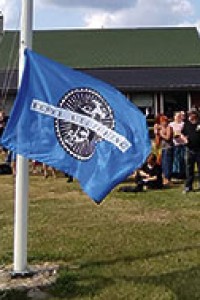Spotlight on: Sean Wallace, Editor
Sean Wallace is the founder and editor for Prime Books, which won a World Fantasy Award in 2006. In the past he was co-editor of Fantasy Magazine, and Hugo Award winning and two-time World Fantasy nominee Clarkesworld Magazine; the editor of the following anthologies: Best New Fantasy, Fantasy, Horror: The Best of the Year, Jabberwocky, Japanese Dreams, and The Mammoth Book of Steampunk; and co-editor of Bandersnatch, Fantasy Annual, Phantom, and Weird Tales: The 21st Century. He lives in Rockville MD with his wife, Jennifer, and their twin daughters, Cordelia and Natalie.
Tell us about starting Prime Books. What made you want to become a science fiction/fantasy publisher?
My family and I would hit up every used bookstore we could every time we traveled around, and it probably was a bit obsessive, but, hey, we loved it. In any case even better is that we usually sought out certain publishers, and their series, like Ace Doubles, and early yellow-spined DAW Books, both of which could be gotten very cheaply, probably for a quarter or 50 cents. (Or we would simply get them in exchange, with trade credit.) I got ’em by the dozen or more and speed-read them through the lot, only keeping the ones that I liked, and trading in the others. I would often wonder how much it would cost to publish a book, and would almost religiously research how it could be done. (Especially reading, over and over again, either Jack Chalker’s The Science-Fantasy Publishers or Mike Ashley’s many-volumed History of the Science-Fiction Magazine). I quickly realized that it might be too expensive, and didn’t do much about it then, but I finally got my opportunity a few years down the road when working with Philip J. Harbottle we launched Cosmos Books… and then I discovered print-on-demand technology… and then I knew what I really wanted to do more than anything else. And somehow in the middle of all that I started up Prime Books, and I haven’t looked back since.
Many of the novels and collections you’ve published have been by first-time or relatively unknown authors who’ve gone on to high-profile careers. What’s your secret? What do you look for when selecting books for publication?
I’ve read a lot, and maybe that’s made me a bit jaded, but I’m always looking for the next new author or project, because that’s where a lot of the excitement is, for me, in taking it and introducing it to a broader audience than just you as the editor or reader. It’s a burning desire to infect others with that same enthusiasm, that here’s someone or something really exciting, and that you have to have a copy. You need to read this author. There’s really no secret, except I think you just know it when you see it, really. (I can still remember, for example, coming across the manuscript for In the Palace of Repose by Holly Phillips, and getting so worked up, in a good way, that I had to call the author later that day. I was hyped-up for days afterwards.) So that’s what you look for, sometimes, something really unique that attracts attention (and sales!).
Prime recently parted ways with Wildside. Does this mean a change in focus for Prime as an independent publisher?
Yes, and no. As a Wildside Press imprint, we became a trade publisher with national distribution. We still are such, so we still look for high quality books with the potential to sell a certain number of copies. And in some ways, we are somewhat more commercially oriented with certain projects because we have a bottom line to meet on our own these days. In other ways, though, we are still doing projects that a New York publisher would not be interested in because they aren’t ‘‘commercial enough’’ or don’t see what we see in them.
You also publish the online magazines Fantasy and Lightspeed. Are there any surprising or notable advantages or challenges when publishing short fiction online?
It’s easier to reach readers. One of the biggest problems with print magazines, from my experience, is that it was always an uphill battle to increase the ‘‘draw,’’ or the distribution orders, unless you’re willing to throw co-op monies down the toilet, and we’re talking a lot of money here. Either way you’re forced to deal with limited reach, and that wasn’t ever going to change. By moving online we’ve been able to introduce new readers to both magazines, in numbers that would have never been possible on the newsstand or with subscriptions. And that translates to increased revenue, whether it’s e-books, or advertising, or something else entirely. So while it’s been a bit more difficult to firm up those revenue streams, initially, it has gotten better in recent years, and while no one’s yet making money hand over fist in great gobs, it’s getting there, knock on wood.
Any exciting new titles or projects coming from Prime that people should keep an eye out for?
All of them! We have two anthologies out soon: Vampires: The Recent Undead, edited by Paula Guran, looks at the last decade in vampire fiction while Bewere the Night, edited by Ekaterina Sedia, concentrates on shape-shifter stories. We’re also very excited about Mechanique: A Tale of the Circus Tresaulti, Genevieve Valentine’s debut novel: beautiful prose, a beautiful but dark story. With Heart of Iron, Sedia offers an adventurous alternative history novel. We also have novels coming up from Brenda Cooper: Mayan December, possibly the only novel about the Mayan calendar and 2012 that intelligent readers will enjoy; and R.A. MacAvoy’s Death and Resurrection which combines kung fu, Asian mysticism, a Native American veterinarian, mystery, and more. We have two terrific collections coming up: Gardner Dozois’s When the Great Days Come and Somewhere Beneath Those Waves by Sarah Monette. And along with our two ‘‘year’s best’’ anthologies (Rich Horton’s The Year’s Best Science Fiction & Fantasy and Paula Guran’s The Year’s Best Dark Fantasy & Horror) we have a very special anthology, Halloween! – you can guess the content from the title – and Creatures: Thirty Years of Monsters, edited by John Langan and Paul Tremblay. I could go on…










Pingback:Speculative Fiction News 1/05/11 | samuel mae
Pingback:Prime Books - Locus Spotlight on Publisher Sean Wallace
Pingback:Prime Books - Locus Spotlight on Publisher Sean Wallace |